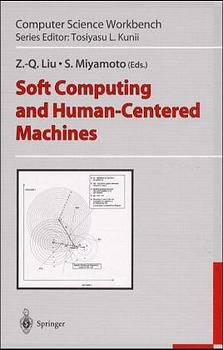
Soft Computing and Human-Centered Machines
Seiten
2000
Springer Verlag, Japan
978-4-431-70279-5 (ISBN)
Springer Verlag, Japan
978-4-431-70279-5 (ISBN)
- Titel ist leider vergriffen;
keine Neuauflage - Artikel merken
This text explains the theory, methodology, and application aspects of human-centered systems, showing how it is possible to extend to machines such techniques as dynamic cognitive learning, neural-fuzzy-based learning, and genetic-evolutionary type learning paradigms.
Today's networked world and the decentralization that the Web enables and symbolizes have created new phenomena: information explosion and saturation. To deal with information overload, our computers should have human-centered functionality and enhanced intelligence, but instead they simply become faster. Soft computing is a unifying framework that combines techniques in neural networks, fuzzy theory, genetic algorithms, and artificial intelligence to develop intelligent systems able to learn in dynamic, imprecise, and uncertain environments. This book explains the theory, methodology, and application aspects of human-centered systems, showing how it is possible to extend to machines such techniques as dynamic cognitive learning, neural-fuzzy-based learning, and genetic-evolutionary type learning paradigms.
Today's networked world and the decentralization that the Web enables and symbolizes have created new phenomena: information explosion and saturation. To deal with information overload, our computers should have human-centered functionality and enhanced intelligence, but instead they simply become faster. Soft computing is a unifying framework that combines techniques in neural networks, fuzzy theory, genetic algorithms, and artificial intelligence to develop intelligent systems able to learn in dynamic, imprecise, and uncertain environments. This book explains the theory, methodology, and application aspects of human-centered systems, showing how it is possible to extend to machines such techniques as dynamic cognitive learning, neural-fuzzy-based learning, and genetic-evolutionary type learning paradigms.
Introduction; multisets and fuzzy multisets; model logic, rough sets, and fuzzy sets; fuzzy cognitive maps - analysis and extensions; methods in hard and fuzzy clustering; soft-competitive learning paradigms; aggregation operations for fusing fuzzy information; fuzzy gated neural networks in pattern recognition; soft computing technique in kansei (emotional) information processing; vagueness in human judgment and decision making; chaos and time series analysis; a short course for fuzzy set theory.
| Erscheint lt. Verlag | 1.5.2000 |
|---|---|
| Reihe/Serie | Computer Science Workbench |
| Zusatzinfo | 95 black & white illustrations |
| Verlagsort | Tokyo |
| Sprache | englisch |
| Gewicht | 660 g |
| Einbandart | gebunden |
| Themenwelt | Informatik ► Office Programme ► Outlook |
| Informatik ► Software Entwicklung ► User Interfaces (HCI) | |
| Informatik ► Theorie / Studium ► Künstliche Intelligenz / Robotik | |
| Informatik ► Weitere Themen ► Hardware | |
| ISBN-10 | 4-431-70279-2 / 4431702792 |
| ISBN-13 | 978-4-431-70279-5 / 9784431702795 |
| Zustand | Neuware |
| Haben Sie eine Frage zum Produkt? |
Mehr entdecken
aus dem Bereich
aus dem Bereich
Buch | Softcover (2022)
Markt + Technik Verlag
14,95 €
Band 1: Grundlagen des digitalen Zeitalters
Buch | Softcover (2024)
Springer Gabler (Verlag)
49,99 €


